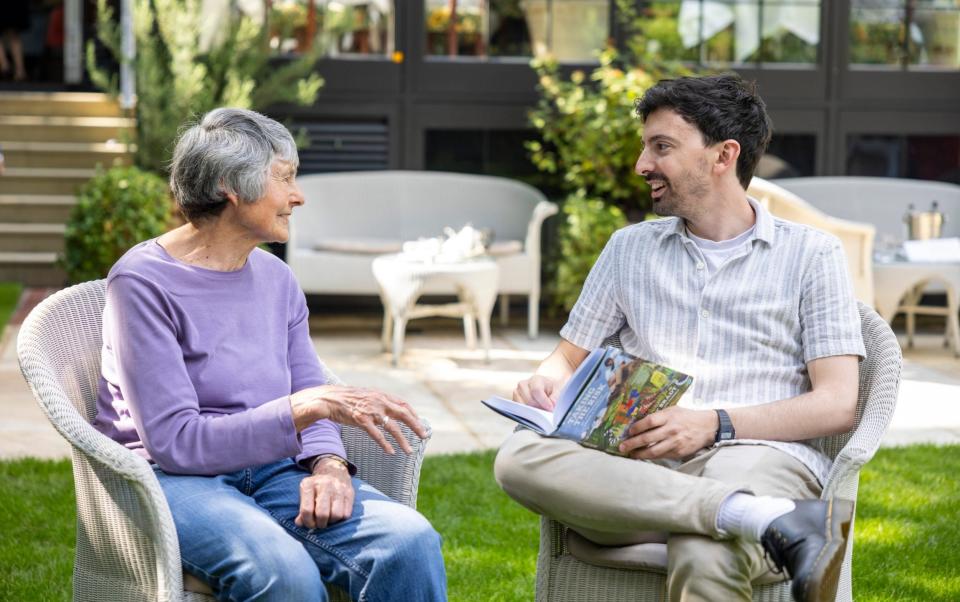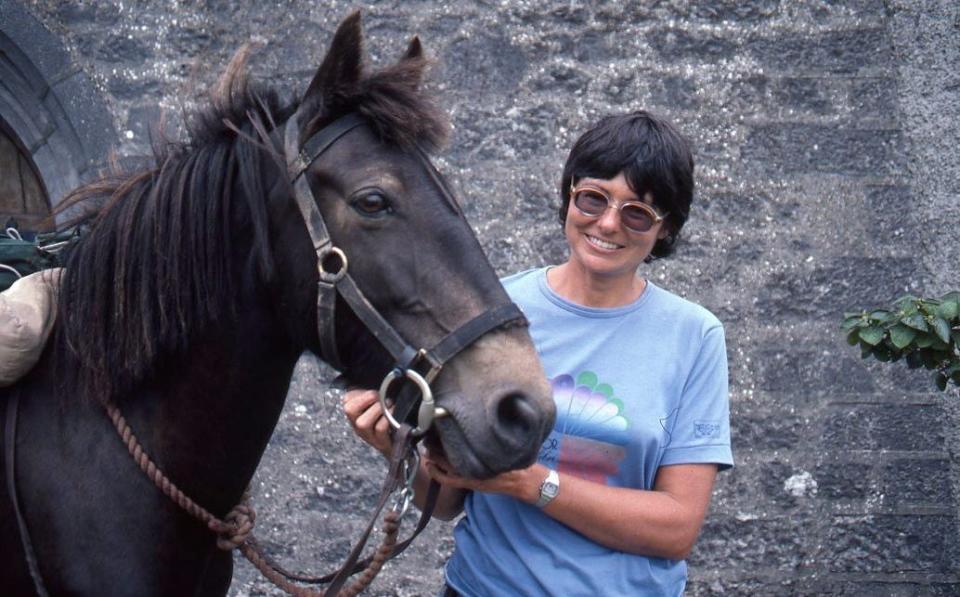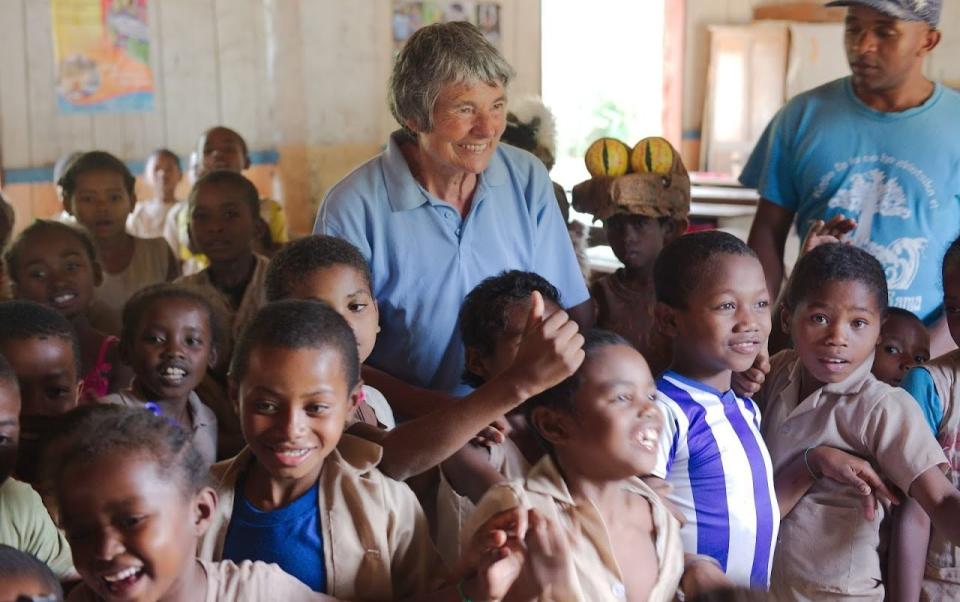In 1973, a 31-year-old Hilary Bradt went hiking in Peru and Bolivia. She traveled light, so light that she had no tent or sleeping bag. Instead, she and her then-husband George took refuge in shepherds’ huts along the way, or tied hammocks between trees.
For three months they crossed the Cordillera Blanca, hiked the Inca Trail to Machu Picchu – they were among the first modern pilgrims to do so – and wound their way along farm paths through the mountains of Bolivia. Since there were no maps or guidebooks, they relied on local information to find their way. The sight of tourists was so unusual that some villagers screamed in fear at the sight of these ‘gringos’ and rushed in to protect their children.
During a three-day riverboat trip in Bolivia, Hilary and George wrote detailed descriptions of these three trips, plus other day hikes. They drew maps and Hilary made the illustrations. Later, back in the US, where Hilary was living with George (a Bostonian), they printed 2,000 copies of the pamphlet on yellow paper. In 1974, Backpacking along ancient roads in Peru and Bolivia was published with a price tag of $1.95. Bradt Gidsen was born.
“We took it to a London publisher and said, ‘Look, we have this beautiful book, would you like to publish it?’ and they said, ‘No. It’s not going to make any money,” Hilary recalls. The London publisher asked if they could write a regular guide to Peru instead. When George said they couldn’t afford to fly back to do the research, the publisher suggested they get the information from tourist brochures. This was obviously not their style.
“That was a pivotal moment,” says Hilary. “If this gets published, we thought, we’ll do it ourselves.”
I meet Hilary in the lounge of the opulent Goring hotel in London. She wears jeans and has a half-open backpack at her side, while waiters in bow ties wander around and businessmen in suits answer phone calls. Hilary says she was afraid the doormen would deny her entry because of her jeans, like a backpacker who has ended up in a fancy hotel where backpackers don’t belong.

“They’re a little frayed at the bottom, but they didn’t notice,” she confides, with a conspiratorial, pinched smile.
Hilary, 82 years old, now sits on the board of directors of Bradt Guides after relinquishing day-to-day management of the company some time ago (George’s involvement ended in 1980 after their relationship ended), but her fire-in- the belly, jeans-at-the-Goring spirit remains a powerful influence in publishing.
“Every country where Britain disapproves of the government, we should make a guide for it,” she laughs, although Bradt’s list of guidebooks suggests she’s just joking.
Today, Bradt Guides is the world’s largest independent guiding company, with titles ranging from Antarctica to Zambia via Karakalpakstan (I had to Google it too), plus Slow Guides to places like Devon and the Cotswolds. But there are also some controversial destinations on the list. Bradt published a guide to Iraq in 2002, a year after September 11, a guide to North Korea in 2008, a book on Saudi Arabia in 2023, and a guide to Afghanistan, currently under Taliban rule, is on the horizon .
Is it responsible to encourage or facilitate travel to these countries, some of which have State Department warnings or reprehensible human rights records? Hilary recalls a press trip she took to Iran shortly after the country reopened to tourists after years of being off-limits.
“We went to a party, and I remember all the women there had skirts,” she points above her knee. “They had their hair out. One woman drank away and said, “You know, I don’t like alcohol, but I have to drink to defy the government.”
“They were well educated, articulate and passionate. If we hadn’t been there and if we hadn’t met these people, we would think that you shouldn’t go to Iran because of their human rights record. But it was a beautiful country and the people were nice.


“The State Department is so general in its warnings. And it’s silly, because ‘dangerous places’ are often the safest places. Where you will be robbed or perhaps run over is Barcelona, for example. This is how you die in a car accident while on holiday, and what a waste.” Only later, as I listen back to our conversation, do I wonder whether the ‘waste’ is the hypothetical car accident, or the fact that British travelers are advised against visiting so many countries.
To this day, Hilary practices what she preaches. In 2020 she visited the island of Socotra in the Indian Ocean, part of Yemen, where the Ministry of Foreign Affairs warns against all travel there. She took out specialized travel insurance for war zones, although it was included for most travelers – and even most travel publications Telegraph travel – The advice of the Ministry of Foreign Affairs should be followed and not ignored.
This month, Bradt Guides published Hilary’s first-ever extended travel memoir, Taking the risk. It’s a home for all the anecdotes that didn’t make it into the guidebooks: smuggling George across the Swaziland border under a blanket in the backseat, being arrested in Tanzania on suspicion of espionage, eating a mysterious green fruit that stuck her lips together. .
The book also demonstrates Hilary’s talent for descriptive observations. In one excerpt, taken from a letter sent to her parents, Hilary describes an ice cave in Perito Moreno, Argentina: “It’s as if Henry Moore has been unleashed with a chisel to suggest human shapes.” Other sections capture the essence of traveling on a budget. She tells of a trip to Big Bend, Texas, where she discovered that the small number of miles on her rental car’s odometer went down, not up, when she reversed. So she drove nine miles forward and then nine miles backward to avoid gaining valuable mileage.
“One of my ambitions is to be a bad influence,” she says, before taking a sip of her English Breakfast tea. Knowing that Hilary met the Queen and became an MBE in 2008 (she suspected the invitation was a ‘hoax’) only adds to her mischievous mystique.
Taking the risk looks back on Hilary’s life in travel and publishing, but what lies ahead? A challenge for publishers of printed travel guides is that today’s travelers find much of their travel inspiration and advice online. But Hilary isn’t too concerned about the long-awaited death of the printed travel guide: “If you’re in Somaliland, your phone would be useless,” she points out. “I may be gone, but my eternal optimism says we will last another fifty years.”


There is also a growing awareness, especially among Gen Z and millennials, about how the aviation industry contributes to climate change. Can a company that depends on people boarding flights survive the 21st century? And besides, should that be the case?
“This is where I jump on my soapbox,” says Hilary. “If you have a private jet and don’t fly, you’re making the right decision. But there is no benefit to the climate or anyone to have an empty seat on a scheduled flight.
“Once you get there, whether it’s Africa or South America, you can do a lot of good by eating local, supporting charities and supporting conservation projects.”
Before Bradt published his groundbreaking travel guide to Madagascar, locals ate lemurs, says Hilary. Now the species is protected and cherished as wildlife tourism has become the country’s main attraction. But the fruits of tourism can also be precarious. During a period of political unrest in Madagascar in the 2000s, foreign tourists stopped visiting, and some women who used to work in hotels resorted to prostitution after losing their jobs.
“We have to keep going to these countries,” Hilary insists on her soapbox, where she belongs. “This is absolutely what we should be doing.”
Taking the Risk by Hilary Bradt (RRP £20) can be purchased from the Telegraph Bookstoreor online at bradtguides.com